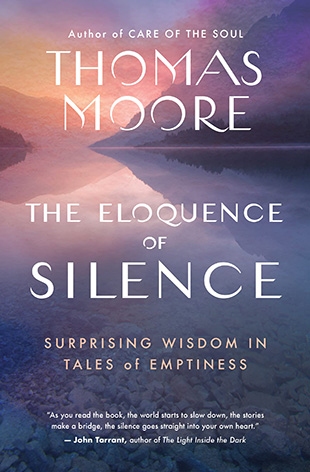Thomas Moore is profiled in S&P’s Living Spiritual Teachers Project, and we have reviewed 19 of his books, going back to his international bestseller Care of the Soul. He has led 10 popular e-courses for S&P and a new one, Myth and Psyche, is running in July/August 2023.
Over the years, we have noticed some things about Thomas Moore's work. While usually focusing on the art of soulful living, he is incredibly eclectic in where he looks through that lens. He finds soul in relationships, education, sex, religion, work, health care, aging, and therapy. He's translated and commented on the Gospels and weaves quotations from other sources throughout his books. We've learned a lot from him about everyday spirituality.
We look forward to new books by Thomas Moore because they are often so surprising. His latest is especially so. He offers 40 short stories and thoughts from the spiritual traditions, folktales, literature, and his own life and then comments on what each has to say about emptiness. Each chapter is only three or four pages, and you don’t need to read them in order. Moore mixes up his messages; some are even paradoxical.
His starting points include stories of the Sufi mullah Nasrudin; passages from the Gospels, the Tao Te Ching, and the Heart Sutra; poetry from Ryokan and Chiyona; teachings from Shunryu Suzuki and Alan Watts; reflections from Teilhard de Chardin, Nicholas of Cusa, Henry David Thoreau; and many more.
Some examples. Here are some lines from the Tao Te Ching:
“Cut out doors and windows for a room
And these holes make the room livable.
You get something from what is present
But you really benefit from what is absent.”
This image of emptiness leads Moore to ask what life would be without empty spaces; he’s inspired to leave empty spaces for doing nothing, gaps in a day’s schedule. “If you fill up your life, nothing unexpected can happen. You can’t make fresh discoveries, and you will have few surprises and revelations.”
After telling the story from the Gospel of Thomas comparing the kingdom of God to the woman carrying grain in a sack with a hole in it so that by the time she gets home, the sack is empty, Moore notes: “To find this desired kingdom, you lose things that are precious to you. Even treasured beliefs must be emptied if you want to live in a community dedicated to love.”
Citing a poem by the Zen nun Chiyono, in which she describes how her old bucket broke from its rotting bamboo and she lost all her water, Moore asks, “How many aspects of our lives have run their course, but we keep at them anyway?”
In a chapter about death, Moore describes “the greatest emptiness of all . . . the space left when we pass on.” He quotes Alan Watts:
“The anxiety-laden problem of what will happen to me when I die is, after all, like asking what happens to my fist when I open my hand, or where my lap goes when I stand up.”
There is something magical and mysterious about appearing in this world and disappearing. From there Moore seques into an affirmation of hope as an open-ended trust in life.
This book is full of wisdom that will spark your own reflections on the way of emptiness. Emptiness, to our mind, is more full of meaning than we had imagined.
